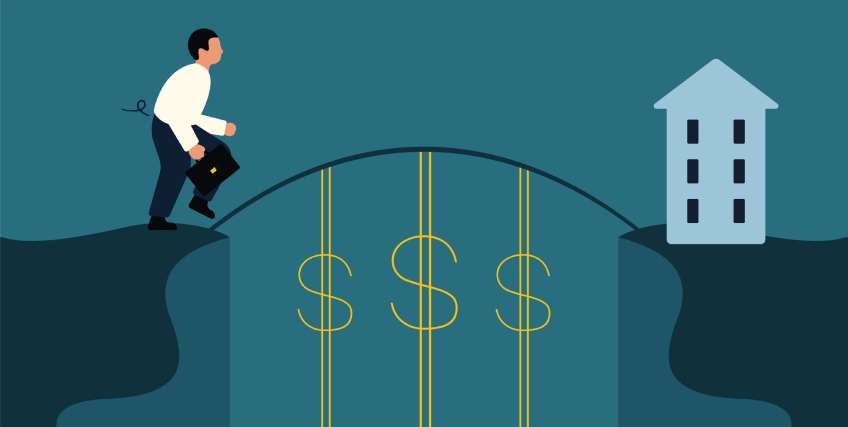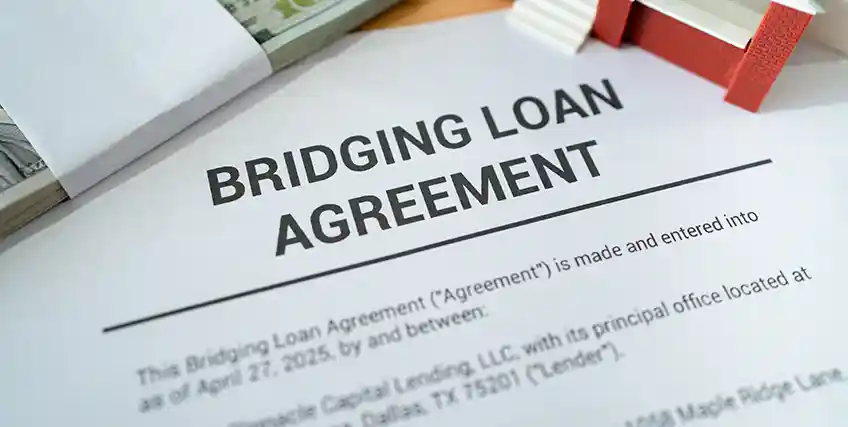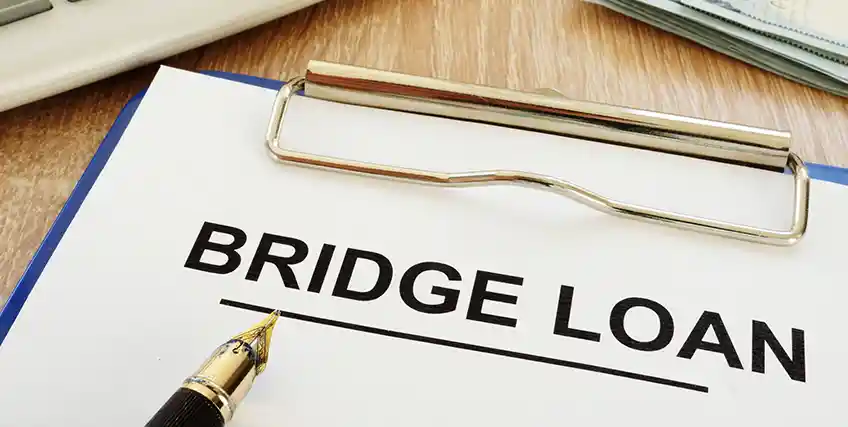How Bridge Loans Help Entrepreneurs Quickly Secure a Small Business Purchase
September 3, 2025 | Last Updated on: September 3, 2025

Buying a business isn't just about the right asking price. It's also about timing. Entrepreneurs often find themselves competing with multiple interested buyers. In industries like retail, logistics, and healthcare, deals can close in days, not months. If financing isn't ready, an opportunity can slip away.
That's where a loan to buy a small business becomes critical. Traditional financing, like an SBA 7(a) loan, often takes weeks for approval. By then, a motivated seller may have already signed with another buyer. Entrepreneurs know the importance of acting quickly, and bridge loans are designed for that very purpose.
Bridge loans are short-term financing solutions that allow small business owners to secure a purchase quickly while preparing for longer-term financing later. Instead of losing out due to delays in credit checks, paperwork, or loan application processes, borrowers can keep negotiations alive and close deals fast.
The ability to move quickly doesn't just improve the odds of securing an existing business – it also strengthens credibility with sellers. Sellers often prefer buyers who demonstrate financial readiness. With a loan to buy a small business, entrepreneurs signal seriousness, agility, and reliability – qualities that matter when deals are on the line
What Is a Bridge Loan in Business Financing?
Bridge loans are often called stopgap financing, and for good reason. They “bridge” the gap between immediate capital needs and long-term funding. When an entrepreneur applies for a loan to buy a small business, waiting months for approval isn't always an option. A bridge loan gives quick access to funds, typically within days, allowing buyers to move fast while arranging permanent financing later.
Unlike a standard SBA loan or term loan, bridge loans are short-term – usually six months to three years. The repayment terms are tighter, and interest rates are higher than traditional business loans. But what entrepreneurs get in return is speed and flexibility. These loans are often backed by collateral, such as commercial real estate or other business assets, giving the lender security in case of default.
Buyers often use bridge loans to cover the down payment on an existing business purchase, manage cash flow, or secure working capital while waiting for long-term financing options like an SBA 7(a) loan. For example, if a buyer spots a profitable retail store up for sale, a bridge loan allows them to sign the deal quickly. Later, they can refinance into a more affordable business acquisition loan with fixed-rate repayment terms.
A bridge loan may not be the cheapest form of business financing, but for entrepreneurs who need to get a loan to buy a business quickly, it can be the most practical option.
Why Entrepreneurs Rely on Bridge Loans
When entrepreneurs spot an opportunity, hesitation can be costly. Sellers rarely wait for weeks while a buyer's loan application goes through the long review process at a bank or with the Small Business Administration. That's why many buyers turn to a loan to buy a small business structured as a bridge loan. It keeps them from losing out in a competitive market.
One of the biggest advantages is speed. While an SBA loan can take up to 90 days for approval, bridge loans often deliver funding quicker. That difference can mean walking away with an existing business or watching a competitor sign the paperwork first.
Bridge loans also improve negotiating power. Sellers see immediate funds as a sign of seriousness. When buyers can show they're ready to close quickly, they often gain leverage to negotiate a better asking price or favorable contract terms. For entrepreneurs trying for a loan to buy a small business, credibility matters almost as much as capital.
Another reason these loans appeal to small business owners is flexibility. Funds can cover a down payment, pay off urgent expenses, or provide short-term working capital while refinancing is arranged. In industries like healthcare and logistics, where contracts and client relationships depend on seamless transitions, that flexibility is invaluable.
Finally, bridge loans act as a steppingstone. They allow borrowers to secure the deal today, then refinance into a longer-term option like an SBA 7(a) loan, a term loan, or even a business line of credit. That pathway makes a loan to buy a small business not just a short-term fix, but a long-term strategy to acquire and grow an established business.
Bridge Loans vs. Traditional Financing
When it comes to applying for a loan, almost every entrepreneur tends to wonder whether speed is worth the higher cost. That's the trade-off between bridge loans and long-term business loans. Let's break it down.
1. Approval Speed
Traditional bank loans or SBA loans often require weeks of paperwork, background checks, and detailed financial statements. That can delay a purchase and frustrate sellers. A bridge loan, however, delivers funds quickly. For buyers needing a loan to buy a small business, that difference can mean walking away with the deal. Sellers often favor the buyer who can show funds fastest.
2. Collateral and Risk
Bridge loans usually come with higher risk for borrowers. Lenders often secure them with commercial real estate, business property, or other assets. By comparison, SBA 7(a) loans sometimes allow more flexibility with collateral requirements. But if the goal is a quick business loan to purchase existing business, many entrepreneurs accept these terms to avoid missing out.
3. Interest Rates and Repayment
The obvious downside is cost. Bridge loans carry higher interest rates than standard term loans. Repayment terms are short, often months instead of years. That can strain cash flow if refinancing is delayed. Still, when entrepreneurs need a loan to buy a small business, some accept the premium for quick access.
4. Flexibility in Transition
One overlooked advantage is flexibility. Buyers can use bridge financing to close quickly, then refinance into more stable financing like an SBA loan or business line of credit. This two-step approach makes a loan to buy a small business both immediate and sustainable, balancing urgency with long-term affordability.
Key Sectors Where Bridge Loans Shine
Not every industry moves at the same pace. Some sectors demand speed, and that's where bridge loans prove their worth. For buyers seeking a loan to buy a small business, timing is the dealmaker.
Retail
Prime storefronts don't stay empty for long. If an entrepreneur hesitates while waiting for a bank's approval, another buyer may swoop in. A bridge loan helps lock the deal before the lease or real estate changes hands. In retail, acting fast is often the difference between owning a thriving shop and watching it from across the street.
Logistics
Trucking companies, warehouses, and supply chain businesses are highly competitive. A missed opportunity could mean losing valuable contracts. By securing a business loan to buy a business through bridge financing, buyers can assure partners and clients of stability. Quick closings help entrepreneurs maintain cash flow and protect future revenue streams.
Healthcare
Medical practices and clinics often sell quickly, sometimes due to retiring doctors or sudden relocations. Buyers with a loan to buy a small business can step in before patients transition elsewhere. For healthcare, timing isn't just about profit; it's also about continuity of care and safeguarding staff and community trust.
Other Sectors
Restaurants, franchises, and startups also benefit. Franchise slots can disappear overnight, and restaurants in prime areas rarely wait for slow financing. Using a loan to buy a small business, entrepreneurs can secure opportunities before they vanish. Sellers respond positively to buyers who show immediate financial readiness.
Risks and Considerations of Bridge Loans
Bridge loans solve timing problems, but they're not without downsides. Any entrepreneur looking for a loan to buy a small business should weigh the following risks before signing.
1. High Interest Rates
Bridge loans carry higher interest rates than traditional SBA loans or term loans. That means monthly payments can be steep. Entrepreneurs often view them as short-term tools, not permanent solutions.
2. Short Repayment Windows
Unlike long-term business loans that stretch over years, bridge loans usually last six months to three years. If refinancing or a business acquisition loan isn't lined up, repayment can strain cash flow.
3. Collateral Demands
Most lenders require security, often commercial real estate or other assets. Entrepreneurs who default risk losing valuable property. By contrast, an SBA 7(a) loan may have more flexible requirements.
4. Need for an Exit Strategy
Bridge loans are designed to be temporary. Without a clear path to refinance into an SBA loan, term loan, or business line of credit, borrowers can get stuck. Planning ahead is non-negotiable.
5. Market and Business Risk
If the acquired existing business underperforms or the market shifts, refinancing might be harder. This leaves the entrepreneur holding costly debt without strong revenue to cover it.
A loan to buy a small business through a bridge loan can be a smart move, but only if the buyer understands the risks and prepares accordingly.
Transitioning to Long-Term Financing
A bridge loan may close the deal, but it's rarely the endgame. Entrepreneurs using a loan to buy a small business usually plan to refinance into a more sustainable product. Long-term financing lowers costs and ensures stability once ownership settles.
No matter the choice, planning is essential. Tax returns, financial statements, and a strong business plan all play a role in refinancing approval. A bridge loan provides speed, but shifting to affordable financing ensures the loan to buy a small business doesn't become a long-term burden.
Conclusion
Buyers who hesitate risk losing prime opportunities to competitors who are ready to act. That's why a loan to buy a small business through bridge financing can be such a powerful tool.
It's not the cheapest financing option – higher interest rates and short repayment terms make that clear. But it gives entrepreneurs the speed and credibility they need in front of sellers. Once the deal is secured, buyers can refinance into longer-term business loans, whether that's an SBA loan, term loan, or a business line of credit.
At the end of the day, the entrepreneurs who win deals are often the ones who prepare both for today and tomorrow. Using a bridge loan wisely means locking in the opportunity now and ensuring it pays off for years to come.
FAQs About Using a Bridge Loan to Buy a Small Business
1. What is a bridge loan and how does it help with a loan to buy a small business?
A bridge loan is short-term financing that provides quick access to funds. It allows entrepreneurs to close on an existing business while waiting for permanent financing like an SBA loan or term loan. For buyers seeking a loan to buy a small business, it prevents delays that could cost them the deal.
2. How fast can entrepreneurs secure funding with bridge loans?
Speed is the main benefit. Traditional business loans or SBA programs may take weeks to approve. In contrast, bridge loans may be able to deliver funds quicker. This makes it ideal for entrepreneurs who need a loan to buy a small business before another buyer steps in.
3. Are bridge loans more expensive than a traditional loan to buy a small business?
Bridge loans typically carry higher interest rates and shorter repayment terms compared to an SBA loan or term loan. While costlier, they provide quick funding, giving entrepreneurs leverage to secure an acquisition when timing is critical. Later, many refinance into long-term business financing to lower costs.
4. Can I get a loan to buy a business if my credit score is average?
It's possible. While strong credit history improves approval chances, many bridge lenders prioritize collateral and deal value over perfect scores. Entrepreneurs with average personal credit may still qualify, though rates might be higher. Refinancing later with an SBA program or preferred lender can help lower payments.
5. What risks should I know before applying for a loan to buy a small business?
Key risks include higher interest rates, short repayment windows, and potential collateral requirements like commercial real estate. Without a clear refinancing plan, borrowers may struggle with monthly payments. Understanding repayment terms and preparing a solid business plan helps reduce the risk of debt becoming unmanageable.
Frequent searches leading to this page
Term Loans are made by Itria Ventures LLC or Cross River Bank, Member FDIC. This is not a deposit product. California residents: Itria Ventures LLC is licensed by the Department of Financial Protection and Innovation. Loans are made or arranged pursuant to California Financing Law License # 60DBO-35839




